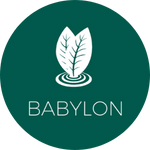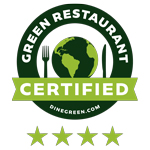
Hello! My name is Jordan Davis and I am your new Sustainability Manager! I was born and raised in Tampa, Florida and attended Florida Gulf Coast University for my undergrad studying Resort and Hospitality Management. I am very excited to share my passion of Sustainability with you at Loyola University Chicago. Go Ramblers!
Want to get involved in Sustainability? Contact Jordan at the email address above.
WHAT WE’RE DOING ON CAMPUS
We work together to continually develop and implement sustainable solutions. Through Green Thread, our environmental sustainability platform, we bring innovative and efficient solutions to life. We are passionately focused on reducing the environmental impact within our operations.
Here are just a few ways we work to make our campus more environmentally conscious:
Babylon Micro-Farm

Have you checked out our micro-farm in Damen Dining Hall? In an effort to reduce our carbon footprint, we will now be sourcing select micro-greens and herbs from our brand-new Babylon Micro-Farm in Damen Dining Hall.
Certifications

We proudly state that Engrained is certified as a 4-Star Green Restaurant. Having Green Restaurant Co-Op Certification is part of our commitment to green and eco-friendly practices. An establishment must meet stringent Green Restaurant Association (GRA) and Green Seal certification requirements to earn the Guaranteed Green sticker. Explore Engrained's Green Report card here.
Cool Food

Cool Food Meals have a low impact on the climate, making them a delicious way to help the planet. Look for the badge above to identify Cool Food’s across campus!
Engrained

Otherwise known as the Green Café, Engrained is the heart of our sustainability goals on campus. We only utilize 100% compostable containers for our We Proudly Brew drinks and are proud to offer a Plant-Forward menu. Amongst many other things, we ensure that our operations are as environmentally friendly as possible.
Local Purchasing

Did you know Dining Services sources food from many local farmers, growers and distributors? The list changes throughout the year depending on seasonality and availability.
Midwest Foods:
A local, women-owned food distributor that partners with many farms and businesses in Illinois, Wisconsin, Michigan, Indiana to offer local and seasonal products such as produce from Windy City Harvest (Chicago) and eggs from Phil’s Eggs (Forreston, IL)
- Deerfield’s Bakery:
A local bakery, based just a few miles northwest of Chicago, that offers unique handcrafted cookies, cakes, pastries, and baked goods that you can find in campus dining halls
West Town Bakery:
A local bakery chain that crafts delicious baked goods, including varieties to suit dietary limitations (e.g., gluten-free, nut-free, vegan). WTB pastries and goodies can be found at Engrained Café and Bleeker Street.
- Alpha Baking
- Schulstad
- Pidy Inc. Pastries
- Alouette
- Van Lang
- Grecian Delight
- El Milagro Mexican Foods
- Miller Poultry
- Packer Foods
- Lakeside Private Label
Responsible Sourcing

Zero Waste Operations

LUC Dining Services partners with campus facilities to recycle cardboard, metal, paper, glass, and accepted plastic products from dining locations and offices. We are committed to minimizing our environmental footprint and look for opportunities to recycle uncommon items—such as batteries and printer cartridges—wherever possible.
Composting is the process of recycling organic materials—such as leaf litter, animal bedding, plant and grass cuttings, and food scraps—into useable, nutrient-rich soil amendments. Dining Services collects pre- and post-consumer food waste and scraps from all dining halls and some campus retail outlets to be composted. Compostable service items, including napkins and wooden stir sticks, are also collected for composting.
Food waste is collected in a compactor on campus that is serviced by Lakeshore Recycling Systems (LRS). LRS transports the waste to an industrial composting facility located in Illinois. (Plant-based organic waste, such as the napkins and food scraps from the dining areas, breaks down many times faster in industrial composting systems than it would in backyard compost bins or in the landfill.) At the composting facility, the waste is mixed with other organic matter and, over time, converted into a nutrient-rich soil medium. This finished compost can be used to support plant growth and soil health in numerous places, including farms, gardens, and landscaping facilities.
Food Waste Minimization/Food Recovery Network

Dining Services follows a 5-part food planning process to minimize the amount of food waste associated with our operations. Using tracking and forecasting tools, we identify popular and less popular dishes and alter our preparation and future volumes accordingly.
We aim to repurpose surplus food when possible, but when we cannot, we look to the second level of the EPA food recovery hierarchy: feed hungry people. Dining Services partners with the LUC Food Recovery Network chapter to collect safe, surplus food and distribute it to local charitable food agencies, like A Just Harvest. While we work with FRN to donate food on a regular basis, we also donate larger volumes of food when Dining Services shuts down for longer periods of time (such as long weekends or holiday breaks). Any food that cannot be donated is composted.
If you are passionate about tackling the problem of food insecurity or are simply interested in volunteering in the community, consider learning more about and joining LUC’s Food Recovery Network chapter. (Check them out on social media @FRNLUC.)
Sip Smarter

Did you know that every year, over 8 million tons of plastic leaks into Earth’s oceans? That’s equivalent to one garbage truck full of plastic dumping its contents into the ocean every minute of every day!
We are committed to reducing our contribution to this issue and phasing out single-use plastics wherever we can across our operations. Dining Services is working to reduce the use of straws in our retail locations and offering straws only upon request where possible. While dining on campus, challenge yourself and your friends to forgo straws, stirrers, and other single-use plastic items wherever possible!
Reusables

Fryer Oil Recycling

Not only do we recycle used fryer oil from our dining halls, but we partner with Green Kitchen Concepts to filter the oil multiple times to extend its lifespan, reducing the total amount of oil we use and waste. When we are finished using the fryer oil, Green Kitchen Concepts places the used oil in designated storage tanks on campus. When these tanks are full, the oil is collected by Green Grease Environmental (GGE), an oil recycling company based in the Chicagoland area, and transported to their processing facility for filtering and cleaning.
GGE delivers the clean oil to the Searle Biodiesel Lab located in the LUC School of Environmental Sustainability. There, the lab team processes the oil into biodiesel that is used to fuel the University’s intercampus shuttles. Glycerin, a byproduct of the biodiesel process, is used to create the BioSoap that is offered in restrooms across campus.
Green Cleaning

At all dining hallsl, Dining Services uses Green Seal® certified cleaning products—from dishwasher detergent to glass cleaner—to protect the environment and the health and wellbeing of our staff and guests. Green Seal® certification identifies products that are “safer for human health and the environment” while still performing as well as conventional alternatives.
The Dining Services team at Damen Dining Hall also uses detergent and sanitizer created through the process of electro-chemical activation (ECA). In the ECA process, regular water with a low concentration of sodium chloride travels through an electrolytic cell; chemical reactions occur to create two distinct end products: a mild detergent and a chlorine-based sanitizing solution that can be used as a disinfectant. Using ECA technology allows us to make cleaning and sanitizing products safely on site, reduces human exposure to chemicals that may be present in other chemicals and cleaning products, and limits contamination of the natural environment from these chemicals.
We plan to complete the transition to green chemicals at de Nobili and Simpson Dining Halls by the end of the spring 2022 semester.
Events








